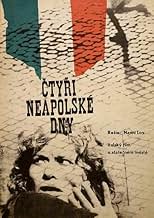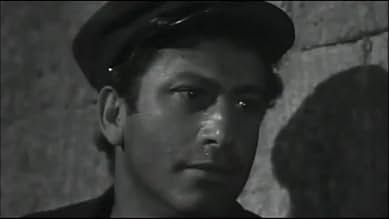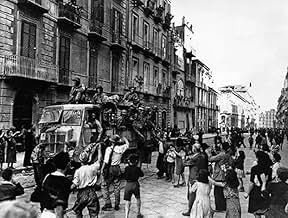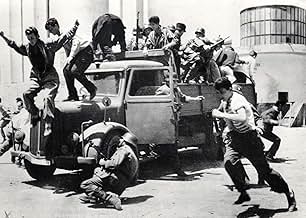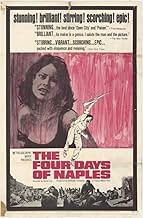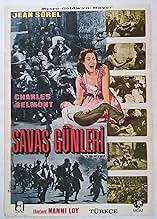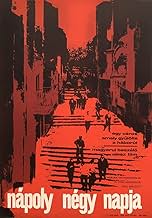IMDb RATING
7.5/10
1.2K
YOUR RATING
In 1943 Naples, civilians spontaneously fought German invaders for four days using makeshift weapons and firearms. 10-year-old Gennarino Capuozzo died heroically on a barricade during the re... Read allIn 1943 Naples, civilians spontaneously fought German invaders for four days using makeshift weapons and firearms. 10-year-old Gennarino Capuozzo died heroically on a barricade during the resistance.In 1943 Naples, civilians spontaneously fought German invaders for four days using makeshift weapons and firearms. 10-year-old Gennarino Capuozzo died heroically on a barricade during the resistance.
- Nominated for 2 Oscars
- 9 wins & 9 nominations total
Raffaele Barbato
- Giovanni Ajello
- (uncredited)
Charles Belmont
- Sailor
- (uncredited)
Regina Bianchi
- Concetta Capuozzo
- (uncredited)
Silvana Buzzanca
- Immacolata
- (uncredited)
Enzo Cannavale
- Partigiano
- (uncredited)
Luigi De Filippo
- Cicillo
- (uncredited)
Adriana Facchetti
- Scared Woman
- (uncredited)
Pasquale Fasciano
- Strongman
- (uncredited)
Domenico Formato
- Gennaro Capuozzo
- (uncredited)
Aldo Giuffrè
- Pitrella
- (uncredited)
Curt Lowens
- Sakau
- (uncredited)
Pupella Maggio
- Arturo's Mother
- (uncredited)
Rosalia Maggio
- Scared Woman
- (uncredited)
Alba Maiolini
- Grieving Woman
- (uncredited)
Lea Massari
- Maria
- (uncredited)
7.51.1K
1
2
3
4
5
6
7
8
9
10
Featured reviews
A beautiful work of art, life and humanity
This film was brought to my attention by a friend who suggested that, since I enjoyed Roberto Rosselini's Open City, I would enjoy this film, which he considered to be even better than Rosselini's. I was impressed, to say the least, and inclined to agree. The story seemed infinitely more real and affecting.
Small stories of individual lives and relationships splintered apart by the actions of Germany in Naples after the Allies have declared victory in Europe in WWII isn't a subject many people will jump at the chance to see, but they should think again. We may never have the experience of being under occupation here in America, but that doesn't mean we can't appreciate and feel the bravery of a city that fights back against the tyranny of the weary German army. And if you have an aversion to war films, subtitled ones in particular, don't worry; the performances from the actors involved are strong enough to feed the emotions onto the screen without need of a translator.
This is a gem not many people know about. It's a shame. This is a film that needs a revolution in the minds of cineastes everywhere.
Small stories of individual lives and relationships splintered apart by the actions of Germany in Naples after the Allies have declared victory in Europe in WWII isn't a subject many people will jump at the chance to see, but they should think again. We may never have the experience of being under occupation here in America, but that doesn't mean we can't appreciate and feel the bravery of a city that fights back against the tyranny of the weary German army. And if you have an aversion to war films, subtitled ones in particular, don't worry; the performances from the actors involved are strong enough to feed the emotions onto the screen without need of a translator.
This is a gem not many people know about. It's a shame. This is a film that needs a revolution in the minds of cineastes everywhere.
10babuon
A wonderful WWII film
I saw this film when it first came out and it gripped me completely. I was quite young and not "into" foreign films, but this film caught me up. It showed a resistance that was unique -- not planned, not secret, but almost spontaneous. It mixes the buffoonery of some of the characters, the cowardice of a few and the bravery of the people of Naples. Some moments bring tears, others laughter. How the people come together to fight the Nazis who were still brutally exerting their power even as the allied forces marched north in Italy is a powerful statement of the will of ordinary Italian citizens.
For years I've tried to buy it, Le Quattro Giornate di Napoli, with no success. Then this year,TCM showed a very clean copy of it. But still I can't find a place to buy it. It is so worth having --
If anyone knows where I can buy it, I would be grateful.
For years I've tried to buy it, Le Quattro Giornate di Napoli, with no success. Then this year,TCM showed a very clean copy of it. But still I can't find a place to buy it. It is so worth having --
If anyone knows where I can buy it, I would be grateful.
Excellent docu-drama on civilians resisting wartime recruitment.
This documentary-style drama shows us the determination of a civilian population to end wartime conscription by a former ally. The Nazi army tries by terror to force the Italian people to join them as they struggle on against the advance of the Allied forces in WWII Italy. Citizens decide against fighting the war any longer, and rally themselves to drive out the German soldiers from their city and their lives in only four days.
I watched this film in basic training camp in 1963. I did not know at the time if I was being ordered to Southeast Asia to participate in the war there or not. I had had a vision on the firing range that an active combat role in Viet Nam would be more terrible than I could ultimately live with in later years. Fortunately, I was sent to the staging area on Okinawa, and not to Viet Nam. I saw the film again when I reached Okinawa, and became aware of the war a thousand miles away.
The film crystalized for me that mankind could choose not to fight wars to settle disputes between countries, and that passionate citizens could resist the most disciplined of armies. The Neopolitan people's example to me from twenty years before, as I stood at the brink of the Southeast Asian war, spoke deeply to me of what humanity must strive to achieve through the advancement of its behavior and character.
I long to see the film again, or to read the source book, as world events swirl around us, echoing themes in the Four Days of Naples.
I watched this film in basic training camp in 1963. I did not know at the time if I was being ordered to Southeast Asia to participate in the war there or not. I had had a vision on the firing range that an active combat role in Viet Nam would be more terrible than I could ultimately live with in later years. Fortunately, I was sent to the staging area on Okinawa, and not to Viet Nam. I saw the film again when I reached Okinawa, and became aware of the war a thousand miles away.
The film crystalized for me that mankind could choose not to fight wars to settle disputes between countries, and that passionate citizens could resist the most disciplined of armies. The Neopolitan people's example to me from twenty years before, as I stood at the brink of the Southeast Asian war, spoke deeply to me of what humanity must strive to achieve through the advancement of its behavior and character.
I long to see the film again, or to read the source book, as world events swirl around us, echoing themes in the Four Days of Naples.
The people of a city and his fight against the tyranny
This good film tell a historical fact: the resistance of the people common of Naples against the Nazi, that they occupied the city in 1943, after the fall of Mussolini. Using only light weapons left by the Italian soldiers, they look for hopelessly to maintain the freedom, once the American soldiers are approximating if. For four days, the heroic resistance of popular gets to maintain the military situation in an impasse... Film of beautiful and touching images, as the father taking the dead combatant son in the arms to be veiled home; the people playing domestic objects of the windows on the Germans or the boys of the reformatory, rebelling and fleeing for they unite to the resistance. Unforgettable!!
Cream of the Crop
A cast of virtual then-unknowns re-enacts the German takeover of Naples following the Italian Army's surrender to the Allies, and the peasant uprising which ensued. "The Four Days of Naples" was released in 1962 and is shown occasionally on Turner Classic Movies, in Italian with English subtitles.
What's most interesting about this film is that director Loy follows many characters and subplots, and often fails to resolve them because they become lost in the chaos of the house-to-house battle within the city. Frank Wolff ("Desert Assault") is Salvatore, who loves Maria (Lea Massari) even though she has married a rich man. The two wind up fighting along side one another; Gian Maria Volonte is the Captain who helps organize a partisan resistance; Aldo Giuffre (The Good, the Bad and the Ugly) is one member of an Italian artillery unit which becomes embroiled in the siege; and Enzo Turco ("Anzio") is a Black-shirt who is taken prisoner despite his Fascist convictions. Every member of the ensemble cast is passionate and utterly convincing. Many were virtually unknown at the time of production, and became big stars in Italy within the next few years.
Director Loy shoots his film with a documentary style. Some shots are well-crafted, though, and give the audience a new perspective on the action. One long pan from a rooftop from which partisans are firing on the Germans shows how the men move from street to street without any cutting at all. The black-and-white cinematography is utterly fantastic. Close-ups of faces deliver all of the drama that dialog simply cannot convey.
The film brings the viewer inside what occupation and resistance do the civilian population of a city. At one point, the Germans drive the citizens out of one quarter so that they can occupy it, forcing people to move in with strangers on the other side of the city. Later, they attempt to conscript Italian men into their labor force, which is what sparks the uprising. The camera follows us into individual homes and family situations, which are ripped apart by the affects of war. He then takes us to massive crowds as they riot in the streets. The scope of battle is excellently captured, as are the cramped alleys and rooms from which the citizens must fight.
There a number of standout vignettes: the Neapolitans throwing furniture from their windows atop the heads of Nazi soldiers in a narrow alleyway; one sequence in which a number of teens escape a reform school to join the fight; a prisoner-negotiation scene in which things go unexpectedly and several Italian civilians are caught in a crossfire; the scene in which the Italian men are taken in trucks to be conscripted, only to have their wives overwhelm the German guards. All of these scenes convey a spirit of freedom, aided by Carlo Rustichelli's rousing score.
"The Four Days of Naples" is a well-crafted drama, intended to be taken seriously, unlike many Italian war films which would follow a few years later. This is an inspiring drama of courage and determination, definitely a must-see for any fan of war films or the Italian cinema.
What's most interesting about this film is that director Loy follows many characters and subplots, and often fails to resolve them because they become lost in the chaos of the house-to-house battle within the city. Frank Wolff ("Desert Assault") is Salvatore, who loves Maria (Lea Massari) even though she has married a rich man. The two wind up fighting along side one another; Gian Maria Volonte is the Captain who helps organize a partisan resistance; Aldo Giuffre (The Good, the Bad and the Ugly) is one member of an Italian artillery unit which becomes embroiled in the siege; and Enzo Turco ("Anzio") is a Black-shirt who is taken prisoner despite his Fascist convictions. Every member of the ensemble cast is passionate and utterly convincing. Many were virtually unknown at the time of production, and became big stars in Italy within the next few years.
Director Loy shoots his film with a documentary style. Some shots are well-crafted, though, and give the audience a new perspective on the action. One long pan from a rooftop from which partisans are firing on the Germans shows how the men move from street to street without any cutting at all. The black-and-white cinematography is utterly fantastic. Close-ups of faces deliver all of the drama that dialog simply cannot convey.
The film brings the viewer inside what occupation and resistance do the civilian population of a city. At one point, the Germans drive the citizens out of one quarter so that they can occupy it, forcing people to move in with strangers on the other side of the city. Later, they attempt to conscript Italian men into their labor force, which is what sparks the uprising. The camera follows us into individual homes and family situations, which are ripped apart by the affects of war. He then takes us to massive crowds as they riot in the streets. The scope of battle is excellently captured, as are the cramped alleys and rooms from which the citizens must fight.
There a number of standout vignettes: the Neapolitans throwing furniture from their windows atop the heads of Nazi soldiers in a narrow alleyway; one sequence in which a number of teens escape a reform school to join the fight; a prisoner-negotiation scene in which things go unexpectedly and several Italian civilians are caught in a crossfire; the scene in which the Italian men are taken in trucks to be conscripted, only to have their wives overwhelm the German guards. All of these scenes convey a spirit of freedom, aided by Carlo Rustichelli's rousing score.
"The Four Days of Naples" is a well-crafted drama, intended to be taken seriously, unlike many Italian war films which would follow a few years later. This is an inspiring drama of courage and determination, definitely a must-see for any fan of war films or the Italian cinema.
Did you know
- TriviaAll actors accepted to be uncredited in honor of the civilians who died during the uprising and remained without official recognition.
- GoofsAt the beginning of the scene in which Allejo and his gang of kids are having a shootout from the mountain train and Cazzillo gets shot, around 1h 31min, a piece of glass in front of him reflects the crew.
- Crazy creditsWhen the MGM lion roars, no sound comes out of its mouth.
- ConnectionsEdited into Film socialisme (2010)
- How long is The Four Days of Naples?Powered by Alexa
Details
Box office
- Budget
- $800,000 (estimated)
- Runtime
- 2h(120 min)
- Color
- Sound mix
- Aspect ratio
- 1.66 : 1
Contribute to this page
Suggest an edit or add missing content

